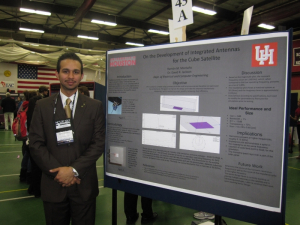Ramon Montano’s parents moved his family from Mexico to the United States in the early 1990’s because “they wanted us to have a good education,” he says. Fast forward to May 2014, and Montano, now an alumnus of the UH Cullen College of Engineering with a degree in electrical engineering, was honored with the Outstanding Honors Thesis award by Dean Joseph Tedesco for his work with transparent antennas for cube satellites.
The award, a new initiative from the Dean’s office, is in its pioneer year with Montano being the first recipient. He began his undergraduate research work with the Provost Undergraduate Research Scholarship (PURS) in 2012, which introduced him to the “CubeSat” research being done in the Cullen College. “Dr. [David] Jackson gave me some real simple tasks to learn the software, simulate a few different types of antennas, and come up with some rudimentary results,” Montano said. But even after the PURS research scholarship ended, Montano continued pursuing his research into CubeSat antenna designs. He travelled to Wisconsin to present his research and attended several national symposiums held in Houston as well. By the time he reached his senior honors thesis, he said, “we hit it hard and did some serious analysis.”
In previous years, senior honors theses were undertaken in the span of one semester, which Montano said simply isn’t enough time for in-depth analysis. “Until now, it’s been ‘Do these simulations and produce these results just in time to graduate’,” he said. “My thesis was a year long, and I was able to go in-depth on the different types of conductors, the different types of design and materials that we can use to make the antennas transparent. We came to some really good results.”
During his senior year, Montano said some of his research came from reading articles on different materials used for satellite antennas. “But the bulk of the time went into simulations,” he said. “Some simulations are known to run from a couple of hours to a couple of days. So toward the end of the semester, I spent a couple of all-nighters running simulations because I needed better results.”
The time commitment is major in of itself, but Montano has also worked for several years as an adjunct professor at San Jacinto Community College, where he taught and continues to teach electrical theory. Before he earned his bachelor’s degree in May, Montano worked for eight years as an electrician, where he earned his master electrician’s license, his journeyman’s license, and his associate’s degree.
At first glance, Montano’s story is one of academic success and achievement, but it is also marred with hardship and struggle. In fact, despite not graduating until 2014, Montano began his studies at UH in 2003 as an architecture major. However, tragedy struck his family when his father passed away suddenly. As the oldest of four children, he decided to begin working as an electrician to support his family. After two years of juggling school and work, he made the difficult decision to withdraw from UH. “In the Spring of 2005, I had a 0.0 GPA for the semester. I’ve had a lot of people shut doors in my face; no internships, no scholarships, nothing.”
While working as an electrician, Montano says he discovered the world of engineering and it piqued his interest. But when he decided to return to UH as an electrical engineering major in 2009, he had to carry over his less than stellar GPA. Where some might have felt they were starting at a disadvantage, Montano found the ambition to push through the barriers. “It’s all about dedication, passion, perseverance. Never take ‘no’ for an answer. Eventually I found the right people through PROMES (Program for Mastery in Engineering Studies) that gave me that first initial step through the workshop facilitator job, and from there I got the PURS, and from there I started travelling to present my research, and from there I got into the [UH] Honors College, then the thesis award. You just can’t take ‘no’ for an answer.”
